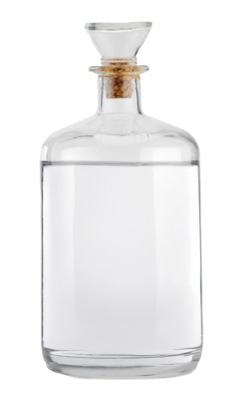Glycerol
85% vegetable Ph. Eur.
| Origin | The botanical origin of glycerine is formed by vegetable oils of various origins, mainly rapeseed, soybean, palm, palm kernel, coconut and linseed oil. |
| Certificates | Kosher |
| Article number | 601005 |

| Origin | The botanical origin of glycerine is formed by vegetable oils of various origins, mainly rapeseed, soybean, palm, palm kernel, coconut and linseed oil. |
| Certificates | Kosher |
| Article number | 601005 |
In the past, the following methods were used to obtain glycerol:
However, all of the above methods have been replaced by the cheaper production of glycerine as a by-product of biodiesel production through transesterification of triglycerides. These are catalytically treated with methanol to form methyl esters of triglycerides and glycerol. In the next step, the crude glycerol is converted into purified glycerol 99%. The glycerol obtained is diluted to 85% with treated purified water according to Ph. Eur..
A syrupy liquid, unctuous to the touch, colourless or almost colourless, clear, very hygroscopic with a sweet taste.
As a natural component of fats and oils, our glycerol is also obtained exclusively from vegetable oils and fats. Therefore, the extraction of glycerine from animal products is excluded and our glycerol is 100% kosher. The production of pharmaceutical glycerol is even more complex than the general steps described above. Organic components and salts are separated from the raw glycerol by vacuum distillation. In order to refine the glycerol to pharmaceutical quality, it additionally passes through bleaching, treatment with activated carbon and filtration. The pharmaceutical quality of our glycerol guarantees highest purity, because the dilution with purified water according to Ph. Eur. prevents contamination e.g. by chlorine and the formation of aldehydes.

Cosmetics
Food
Pharmaceutics
The glycerol we offer is generally only a by-product of biodiesel production. Since the 2010 harvest, only biomass that has been demonstrably sustainably produced may be used for biofuels and bioelectricity. This is prescribed by the Biofuel Sustainability Regulation and the Biomass Electricity Sustainability Regulation issued to implement EU law (Directive 2009/28). The two regulations apply to biomass from Germany as well as from other countries if it is recorded against the biofuel quota, a tax reduction or remuneration under the Renewable Energy Sources Act (EEG) in Germany.
These sustainability regulations for the biomass electricity and biofuel sectors are an important part of the German government's policy for implementing the energy and climate protection targets.
25,000
kg
Tank truck
1,250
kg
IBC
250
kg
Drum
30
kg
Canister
General durability: IBC, drum & canister 12 months
| Nutritional value | (per 100g) |
| Energy | 1,525 kJ / 365 kcal |
| Fat | max. 0.1 g |
| Saturated fatty acids | max. 0.1 g |
| Carbohydrates | 85 g |
| Sugars | max. 0.1 g |
| Polyols | 85 g |
| Protein | max. 0.1 g |
| Salt | max. 0.1 g |
Request now free of charge and without obligation from Gustav Heess. We deliver Glycerol ...
We offer Glycerol in the following packaging units: